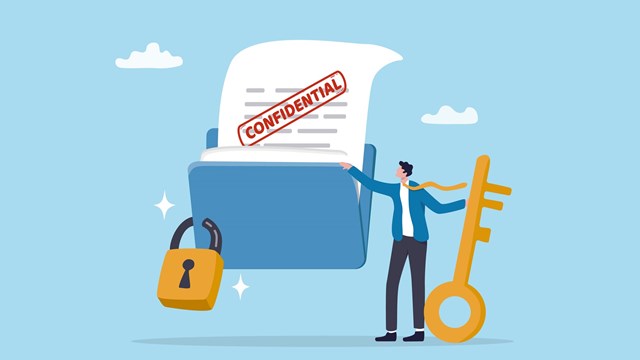Paper, or electronic? It’s now a choice for everything, from the books we read for pleasure to the books we keep on our associations and corporations. Even restaurant menus are digital today in the wake of the need for ‘touch-free’ environments amid the COVID-19 pandemic. With that said, co-op and condo communities generate volumes of information and data every year, from minutes of meetings to receipts for expenses and payments to financial information on unit and share buyers. But how much of all that really needs to be kept, and for how long? And is there anything that should be kept specifically in paper form, as well as digitized?
What Does the Law Say?
Mark Hakim, an attorney with the firm Schwartz Sladkus Reich Greenberg Atlas, is of counsel to numerous co-op and condo buildings in the greater New York area. According to him, “Under Section 624(a) of the Business Corporation Law of the State of New York (BCL), corporations are required to maintain ‘correct and complete books and records of account and shall keep minutes of the proceedings of its shareholders, board, and executive committee, if any, and shall keep at the office of the corporation in this state or at the office of its transfer agent or registrar in this state, a record containing the names and addresses of all shareholders, the number and class of shares held by each, and the dates when they respectively became the owners of record thereof. Any of the foregoing books, minutes, or records may be in written form or in any other form capable of being converted into written form within a reasonable time.’
“In essence,” Hakim continues, “there is nothing in the BCL that mandates a paper format. We often counsel our clients asking each to apply common sense while keeping in mind what may be necessary with respect to tax records (and audits) and in the unfortunate event of litigation. We would always recommend keeping original signed documents such as proprietary leases, recognition agreements, tax records, and other agreements in written form, while simultaneously maintaining electronic copies of each, together with electronic copies of the balance of the corporation’s records.”
Richard Brooks is a principal with the law firm of Marcus, Errico, Emmer & Brooks located in Braintree, Massachusetts, and says that “in whatever format they are contained, certain records must be accessible to the owners per the [Massachusetts condominium] statute. Not all records have to be reviewable—the statute contains a list. It may actually be easier to let owners have access if they are in electronic format. Most professionally managed associations are putting the records online so that owners have access without much trouble. Therefore, there is more transparency, and it is easier for everyone involved.”
The Practical Approach
“Pre-pandemic,” says Dan Wollman, CEO of Gumley Haft, a management firm based in New York City, “[our company was] moving to a new space that was smaller than our previous office. We scanned a million documents—we also got rid of a lot of documents. We culled through the files and scanned every single closing file, approved board package, stock certificate, financing info, etc. We had all this in a huge file room before. Now that it’s all been digitized, that room barely exists. When someone sells their apartment, their file gets deleted because we don’t need it anymore. Digitization is secure, protected, and available when needed. Everything is backed up in the Cloud. Everything is in a secure place with limited access, and we have lots of bells and whistles for security.”
“We shifted to digital records some eight or nine years ago,” says Scott Wolf, managing partner at Briggs, a large real estate management firm located in Massachusetts. “We started converting documents when scanning became available. Digitization got rid of the file cabinets and boxes. I myself like paper, but I’ve come to understand that it’s redundant. Everything is available online now. We email everything with attachments, so no more shifting papers and boxes. This is particularly important now in light of COVID-19. I believe a majority of our competitors have converted to digital as well.”
Are All Documents Equal?
“Ninety percent of what we receive now is digitized,” says Wollman. “This process applies to everything: bank statements, invoices, bids all arrive digitized. Nothing comes by paper anymore. You can attach things to email digitally, so we don’t even write checks anymore. Everything is done electronically. If we do have to process anything, we scan it and send it to a bank or whoever the recipient might be.”
Wollman stresses that most companies are moving in this direction, and if they aren’t, they’re way behind the curve. The digital revolution has been underway for long enough for most businesses to have gotten on board—and condos, co-ops, and HOAs are embracing it as well, to the point that most boards and management companies consider digital information storage and communication to be best practices.
Security of that information and communication remains a top priority. Very sensitive information must be handled appropriately, no matter what format it’s in. “We do our best to keep things as secure as possible,” Wollman says. “Board packages are sent through Dropbox or BuildingLink. Nothing with sensitive information is sent by attached email anymore. There’s no security there.”
In terms of what might be necessarily kept in both digital and print formats, Wolf says he takes a ‘belt-and-suspenders’ approach with some types of documents. “There’s nothing I can think of that cannot be digital,” he says. “But there are documents which are mandatory to be signed and sent to the Registry of Deeds. We keep a paper copy of these, and when they become official, they are saved electronically as well. Initially we saved legal documents, insurance claim information, and items like that—but over time, we realized we didn’t need any paper at all. We used to keep leases in a hard copy in Massachusetts, but not any longer. From a condo standpoint, everything gets digitized. The majority of new paper we receive today comes from new business inherited from other companies sending their stuff to us as new management.”
An Accountant Weighs In
Avi Zanjirian, a partner with the Manhattan-based accounting firm of Czarnowski & Beer, sees digitization as a positive trend for accounting in the co-op and condominium sphere—but he does note some points of concern. For example, digitized information is easily accessed, and can be accessed from anywhere—which is extremely convenient, but also poses some risks. “No one wants cabinets of paper for seven years,” he says, “but if everything is digitized on a server and you have closing statements, bank statements, transfers, etc., personal information must be secure. If you keep that on the Cloud and you get hacked, that’s a potential problem.”
Lastly, Zanjirian points out that with the possible exception of mortgage documents, nothing really needs to be kept in both digital and paper forms. Scanned documents stored online are protected and more secure than paper—but Zanjirian stresses that when scanning documents, it’s vital to make sure the entire doc is scanned; those doing the scanning should make sure to check for double-sided sheets, and that pages aren’t stuck together. If someone feels the need to keep paper copies, one year should be enough time to retain most documents.
As more and more of our administrative and personal lives move online and into the Cloud, building and association managers, attorneys, accountants, board members, and—when appropriate—residents need to have access to crucial documents, while also being assured that those documents are stored securely and appropriately. With everything in one easily accessible place, tasks like audits and reviews become easier to complete. The key is security and conscientious care when transferring and storing records.
A J Sidransky is a staff writer/reporter for New England Condominium, and a published novelist.










Leave a Comment